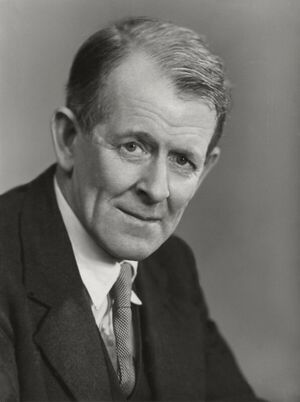Difference between revisions of "James Calvert Spence"
WikiModEn2 (talk | contribs) |
WikiModEn2 (talk | contribs) (→Honours: Revise citation.) |
||
| Line 78: | Line 78: | ||
}} | }} | ||
==Honours== | ==Honours== | ||
| − | His majesty King George VI recognised his contributions with a knighthood in 1950.<ref>{{ | + | His majesty King George VI recognised his contributions with a knighthood in 1950.<ref>{{REFweb |
| − | </ref> | + | |url=https://en.wikipedia.org/wiki/1950_Birthday_Honours |
| + | |title=1950 birthday Honours | ||
| + | |last= | ||
| + | |first= | ||
| + | |init= | ||
| + | |publisher=Wikipedia | ||
| + | |date= | ||
| + | |accessdate=2023-03-28 | ||
| + | }}</ref> | ||
The British Paediatric Association created the James Spence Medal, which is awarded annually since 1960 for "outstanding contributions to the advancement or clarification of paediatric knowledge."<ref name="spence">{{REFjournal | The British Paediatric Association created the James Spence Medal, which is awarded annually since 1960 for "outstanding contributions to the advancement or clarification of paediatric knowledge."<ref name="spence">{{REFjournal | ||
Revision as of 14:39, 28 March 2023
Construction Site
This article is work in progress and not yet part of the free encyclopedia IntactiWiki.
Professor Sir James Calvert Spence, M.D.[a 1], FRCP[a 2], (19 March 1892 in Amble, Northumberland, United Kingdom – 26 May 1954) was a prominent British paediatrician in the early twentieth century.
Spence was a founding member of the British Paediatric Association (later known as the Royal College of Paediatrics and Child Health) in 1928.
He established his practice at Newcastle upon Tyne where he developed an interest in social paediatrics, which included interests in support for breastfeeding[1] and in providing adequate nutrition to children in poor families,[2] as the British nation entered World War II and shortages of food multiplied.
Douglas Gairdner joined him in 1945 as his first assistant and stayed until 1948 during which time Spence served as a mentor to the younger Gairdner. Spence urged Gairdner to write a review of infant circumcision, which was published in the British Medical Journal on Christmas Eve, 1949.[3]
Publications
 Spence JC. Spence on circumcision. Lancet. 24 October 1964; 2: 902. Retrieved 26 March 2023.
Spence JC. Spence on circumcision. Lancet. 24 October 1964; 2: 902. Retrieved 26 March 2023.
Honours
His majesty King George VI recognised his contributions with a knighthood in 1950.[4]
The British Paediatric Association created the James Spence Medal, which is awarded annually since 1960 for "outstanding contributions to the advancement or clarification of paediatric knowledge."[5]
The James Calvert Spence College in Amble, Northumberland, actually a co-educational secondary school, was named in his honour.
Death
Spence had an extended illness which led to his death at age 62 on 26 May 1954.[6]
External links
 Wikipedia article: James Calvert Spence. Retrieved 26 March 2023.
Wikipedia article: James Calvert Spence. Retrieved 26 March 2023.
Abbreviations
- ↑

Doctor of Medicine
, Wikipedia. Retrieved 14 June 2021. In the United Kingdom, Ireland and some Commonwealth countries, the abbreviation MD is common. - ↑

Fellow of the Royal College of Physicians
, Wikipedia. Retrieved 13 January 2021.
References
- ↑
 Spence JC. The modern decline of breastfeeding. Br Med J. 8 October 1938; 2(4057): 729-33. PMID. DOI. Retrieved 26 March 2023.
Spence JC. The modern decline of breastfeeding. Br Med J. 8 October 1938; 2(4057): 729-33. PMID. DOI. Retrieved 26 March 2023.
- ↑
 Spence JC. The Feeding of Children. Br Med J. 20 July 1940; 4159: 93-5. PMID. PMC. DOI. Retrieved 26 March 2023.
Spence JC. The Feeding of Children. Br Med J. 20 July 1940; 4159: 93-5. PMID. PMC. DOI. Retrieved 26 March 2023.
- ↑
 Gairdner DMT. The fate of the foreskin: a study of circumcision. British Medical Journal. 1949; 2(4642): 1433-7. PMID. PMC. DOI. Retrieved 28 October 2019.
Gairdner DMT. The fate of the foreskin: a study of circumcision. British Medical Journal. 1949; 2(4642): 1433-7. PMID. PMC. DOI. Retrieved 28 October 2019.
- ↑

1950 birthday Honours
, Wikipedia. Retrieved 28 March 2023. - ↑
 The James Spence Medal. Archives of Disease in Childhood. 1977; 52(2): 85–86. PMC. DOI. Retrieved 27 March 2023.
The James Spence Medal. Archives of Disease in Childhood. 1977; 52(2): 85–86. PMC. DOI. Retrieved 27 March 2023.
- ↑
 Anonymous. Sir James Spence obituary. Indian Journal of Pediatrics. July 1954; 21: 193. Retrieved 27 March 2023.
Anonymous. Sir James Spence obituary. Indian Journal of Pediatrics. July 1954; 21: 193. Retrieved 27 March 2023.
